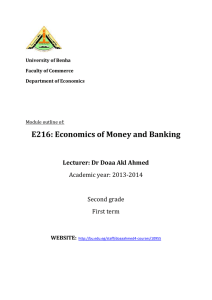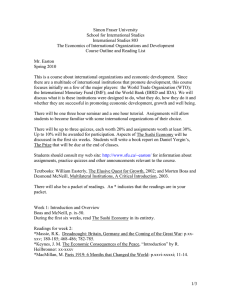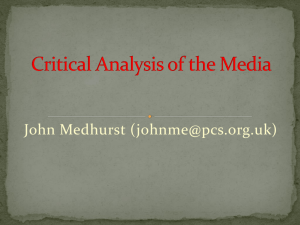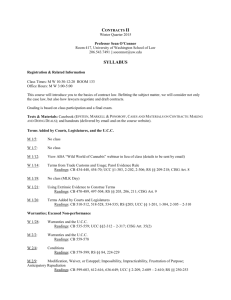International Business – 45 h
advertisement
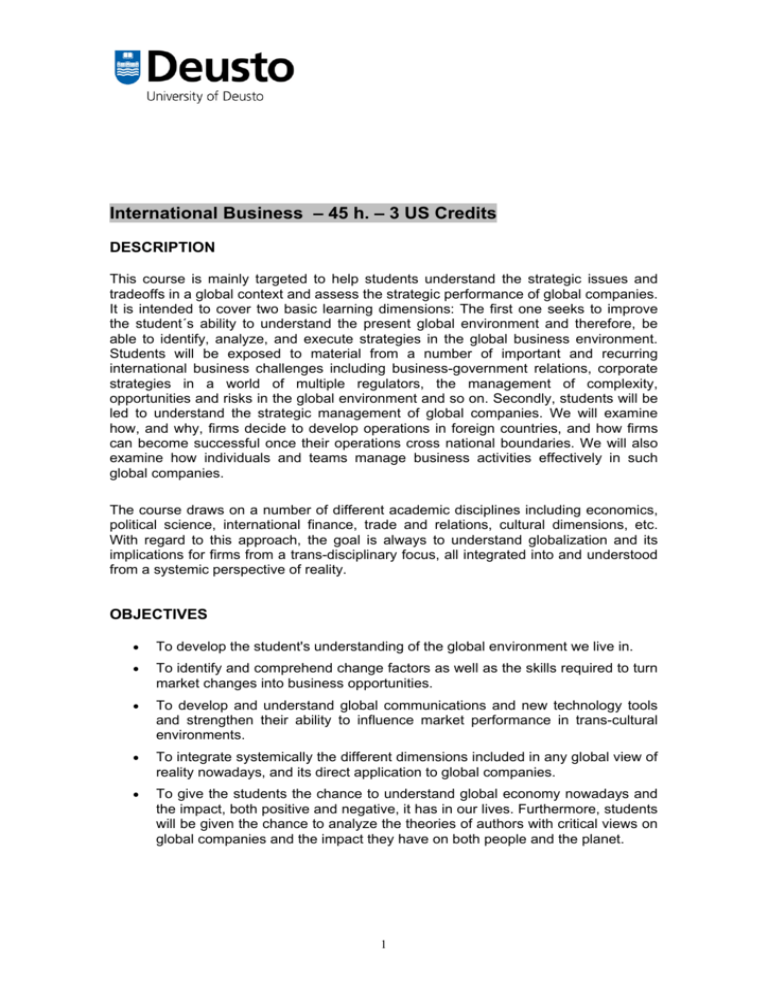
International Business – 45 h. – 3 US Credits DESCRIPTION This course is mainly targeted to help students understand the strategic issues and tradeoffs in a global context and assess the strategic performance of global companies. It is intended to cover two basic learning dimensions: The first one seeks to improve the student´s ability to understand the present global environment and therefore, be able to identify, analyze, and execute strategies in the global business environment. Students will be exposed to material from a number of important and recurring international business challenges including business-government relations, corporate strategies in a world of multiple regulators, the management of complexity, opportunities and risks in the global environment and so on. Secondly, students will be led to understand the strategic management of global companies. We will examine how, and why, firms decide to develop operations in foreign countries, and how firms can become successful once their operations cross national boundaries. We will also examine how individuals and teams manage business activities effectively in such global companies. The course draws on a number of different academic disciplines including economics, political science, international finance, trade and relations, cultural dimensions, etc. With regard to this approach, the goal is always to understand globalization and its implications for firms from a trans-disciplinary focus, all integrated into and understood from a systemic perspective of reality. OBJECTIVES • To develop the student's understanding of the global environment we live in. • To identify and comprehend change factors as well as the skills required to turn market changes into business opportunities. • To develop and understand global communications and new technology tools and strengthen their ability to influence market performance in trans-cultural environments. • To integrate systemically the different dimensions included in any global view of reality nowadays, and its direct application to global companies. • To give the students the chance to understand global economy nowadays and the impact, both positive and negative, it has in our lives. Furthermore, students will be given the chance to analyze the theories of authors with critical views on global companies and the impact they have on both people and the planet. 1 CONTENTS Part I: Global Business Environments Chapter 1. Globalization Chapter 2. Cross-Cultural Business Chapter 3. Politics, Law, and Business Ethics Chapter 4. Economics and Emerging Markets Part II: International Trade and Investment Chapter 5. International Trade and Foreign Direct Investment Chapter 6. Regional Economic Integration Part III: The International Financial and Monetary System Chapter 7. International Financial Markets and the International Monetary System Part IV: International Business Management Chapter 8. International Strategy and Organization Chapter 9. Analyzing International Opportunities and selecting and managing entry modes Chapter 10. Marketing, production and human resources in global Business Part V: Anti-globalization Theories and Criticism to International Business Chapter 11. Anti-globalization. A study on the most influential authors and theories. METHODOLOGY The course combines presentations, cases, discussions, films and readings to provide a mix of integrating concepts and hands-on problem solving. The methodology is dynamic and innovative: an open forum in which each participant plays an active role. Students will be exposed to real-life business experiences, experimentation, case study development and discussions. Students are expected to actively participate in the classes, and to write essays to be assigned throughout the course. Only through this participation the experience will truly be a learning experience. Students will also be expected to take their learning well beyond memorization and preparation for exams. They will only reach their target through a process -one that is created and enhanced through deep observation and discussions. All this, together with the final exam, will determine the students’ final grade. ASSESSMENT The final grade will be calculated according to the following percentages: - Assignments and essays: 30% Oral presentations: 10% Participation: 10% Midterm exam: 20% 2 - Final exam: 30 % BIBLIOGRAPHY BOOKS Parts I to IV - WILD, J. and WILD, K., International Business-Global Edition, Ed. Pearson, 6th ed., London, 2.011. - DANIELS, J., RADEBAUGH, L. and SULLIVAN, D., International Business-Global Edition, 13th ed., Ed. Pearson, London, 2.011. Part V - HAWKEN, P., The Ecology of Commerce, Ed. Harper Collins, New York, 1.993. - KLEIN, N., The Shock Doctrine: The Rise of Disaster Capitalism, Ed. Metropolitan Books,New York, 2.007. - CHOMSKY, N., Manufacturing Consent: The Political Economy of the Mass Media (with Edward Herman), Ed. Pantheon Books, New York, 1988. - WERNER, K. and WEISS, H., The Black Book on Brand Companies, Ed. Random House Mondadori, Barcelona, 2004. FILMS Part V - ACHBAR, M. and ABBOTT, J. (Dir.), The Corporation, Big Picture Media Corporation, 2.004. - ACHBAR, M. and WINTONICK, P. (Dir.), Manufacturing Consent. Noam Chomsky and the Media, Humanist Broadcasting Foundation, Hilversum, Netherlands, 1.992. ONLINE RESOURCES Parts I to IV www.fraserinstitute.org www.freetheworld.com http://www.pri-center.com/country/index.cfm http://www.aon.com/risk-services/political-risk.jsp www.livemint.com/gpri http://www.livemint.com/2009/12/22213933/A6D120D1-317A-443E-81B5B726BE09A47BArtVPF.pdf www.eiu.com www.exclusive-analysis.com Part V www.a-new-humanity.org (www.anhglobal.org) www.chomsky.info www.consumersinternational.org www.democracynow.org www.disinfo.com www.fair.org www.multinationalmonitor.com www.naomiklein.org 3 www.nologo.org www.pbs.org/wgbh/pages/frontline/view/ www.projectcensored.org www.shockdoctrine.com www.thecorporation.com www.thenation.com www.thetake.org READINGS During the course, apart from various references and readings from a number of books, we will be working with an important number of selected readings from a very important amount of international sources: • Business Week Online • Fortune Magazine • International Monetary Fund Staff Papers • International Center for Trade & Sustainable Development • Journal of Economic Growth • Review of International Economics • The Economist • The Economist Intelligence Unit • The McKinsey Quarterly • Transparency International • World Bank Economic Review • World Economic Forum 4






